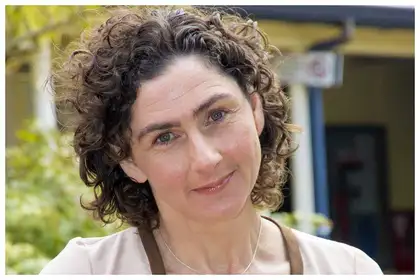
Associate Professor Mary Breheny.
By Associate Professor Mary Breheny
There was a lot of talk at the beginning of lockdown on hoarding: those selfish people who took their bulging wallets to the supermarket to pile trolleys high with pasta and toilet paper and smugly returned home to alleviate their pandemic anxieties by stacking them in pantries crammed full to bursting.
I did a little of this, limited mostly by the ways that my pantry is already typically apocalypse-ready anyway. (Years ago, I had a psychology lecturer who told me that my Irish heritage had shaped my psyche to such a degree that I would always need to be ready for the next potato famine. I was never sure if she was joking or not.)
During lockdown I heard of others looking forward to clearing out freezers that they seldom ever saw the bottom of. This narrative of plenty was not the case for all.
Commentators have already highlighted the yawning gaps between how we all lived in lockdown. Baking and biking and basket-weaving in some households. Glimpsing a different way of life, altered perspectives, taking up new pastimes.
In others, new fears and anxieties. Securing food, avoiding violence, accessing health services all made more difficult by social distancing and household isolation.
Living in lockdown highlighted huge inequities in how resources are allocated in Aotearoa/New Zealand.
That isn’t news. Lots of opinion pieces have been written that mention this. They argue that these differences in access to all the resources necessary to live healthy and fulfilling lives are unfair. They argue we should use our new shared sense of purpose to address systemic inequities between members of the team of five million.
I agree with these sentiments entirely. What I want to add is this: I fear that such transformation could be derailed by the ways we argue for change.
I read with disbelief when arguments for a more equitable future shift from cohesion to demonising others as villains responsible for our present troubles: How can an argument to build a new and more cohesive future claim that the ‘middle-class’ is of no interest? How can arguments for lifetime security for all shift to cast out whole generations at a time: “OK, Boomer” anyone?
The stories we tell about each other matter. The threadbare characters we create in the process shift us further apart.
I agree we don’t all have the same worries and concerns, the same pantries bare of food and the same lives of anxiety and challenges to dignity. I agree it must be addressed urgently. And I can understand the impetus to equalise unfairness by wresting security from those who take it for granted.
But I cannot imagine how equality of opportunity and dignity and security for all can be built on a politics of resentment and antipathy.
If the lesson of this pandemic is to see things differently, to make a new future, then changing the rhetoric may be an important part of this. Familiar arguments that we are in competition for scarce resources is part of the problem.
We are served up versions of this from all sides. It is the basis of suggestions that child poverty can only be solved by limiting NZ Super, or that beneficiaries are living large on the efforts of hard-working taxpayers. Winning the game is predicated on aligning with one group and undermining another. Framing issues like this makes it impossible to imagine how we could provide better for everyone.
Maybe as this election rolls around we have an opportunity to resist using such caricatures to represent members of our communities: young or old, employer, employee, or beneficiary, new arrival or citizen of long standing. We need to know the impact of policies on people. But these are not people; they are paper targets for arguments to take aim at.
One way we can push back against the politics of discord is to demonstrate our intolerance for rhetoric that sets our diverse communities against each other. To let politicians know that we are not interested in creating a society of winners and losers. It is a façade, this competition, designed to distract from equitable distribution of resources to diverse communities within society.
This is the year of rhetoric; by election night most people who voted and all of those who didn’t will be weary of the slogans and electioneering and partisanship.
As we launch into the weeks ahead, I hope our politicians focus on how policies shape the distribution of the resources required for a healthy life in our society. It is these policies that should be the focus rather than fuelling a politics of discord.
Dr Mary Breheny is an Associate Professor of Health Sciences at Massey University. Her research examines how the experiences people have over their lives shapes their health in older age. This article was first published in Stuff